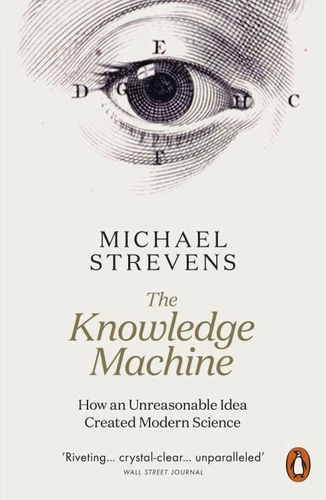The Knowledge Machine. How an Unreasonable Idea Created Modern Science
Par :Formats :
Disponible dans votre compte client Decitre ou Furet du Nord dès validation de votre commande. Le format ePub protégé est :
- Compatible avec une lecture sur My Vivlio (smartphone, tablette, ordinateur)
- Compatible avec une lecture sur liseuses Vivlio
- Pour les liseuses autres que Vivlio, vous devez utiliser le logiciel Adobe Digital Edition. Non compatible avec la lecture sur les liseuses Kindle, Remarkable et Sony
- Non compatible avec un achat hors France métropolitaine
 , qui est-ce ?
, qui est-ce ?Notre partenaire de plateforme de lecture numérique où vous retrouverez l'ensemble de vos ebooks gratuitement
Pour en savoir plus sur nos ebooks, consultez notre aide en ligne ici
- Nombre de pages368
- FormatePub
- ISBN978-0-241-20579-2
- EAN9780241205792
- Date de parution01/10/2020
- Protection num.Adobe DRM
- Infos supplémentairesepub
- ÉditeurPENGUIN
Résumé
Rich with tales of discovery from Galileo to general relativity, a stimulating and timely analysis of how science works and why we need it. 'The best introduction to the scientific enterprise that I know. A wonderful and important book' David Wootton, author of The Invention of Science It is only in the last three centuries that the formidable knowledge-making machine we call modern science has transformed our way of life and our vision of the universe - two thousand years after the invention of law, philosophy, drama and mathematics.
Why did we take so long to invent science? And how has it proved to be so powerful? The Knowledge Machine gives a radical answer, exploring how science calls on its practitioners to do something apparently irrational: strip away all previous knowledge - such as theological, metaphysical or political beliefs - and channel unprecedented energy into observation and experiment. In times of climate extremes, novel diseases and rapidly advancing technology, Strevens contends that we need more than ever to grasp the inner workings of our knowledge machine.
'A stylish and accessible investigation into the nature of the scientific method' Nigel Warburton, Philosophy Bites'This elegant book takes us to the heart of the scientific enterprise' David Papineau, King's College London, author of Knowing the Score'This book is a delight to read, richly illustrated with wonderfully told incidents from the history of natural science' Nancy Cartwright, University of California San Diego
Why did we take so long to invent science? And how has it proved to be so powerful? The Knowledge Machine gives a radical answer, exploring how science calls on its practitioners to do something apparently irrational: strip away all previous knowledge - such as theological, metaphysical or political beliefs - and channel unprecedented energy into observation and experiment. In times of climate extremes, novel diseases and rapidly advancing technology, Strevens contends that we need more than ever to grasp the inner workings of our knowledge machine.
'A stylish and accessible investigation into the nature of the scientific method' Nigel Warburton, Philosophy Bites'This elegant book takes us to the heart of the scientific enterprise' David Papineau, King's College London, author of Knowing the Score'This book is a delight to read, richly illustrated with wonderfully told incidents from the history of natural science' Nancy Cartwright, University of California San Diego
Rich with tales of discovery from Galileo to general relativity, a stimulating and timely analysis of how science works and why we need it. 'The best introduction to the scientific enterprise that I know. A wonderful and important book' David Wootton, author of The Invention of Science It is only in the last three centuries that the formidable knowledge-making machine we call modern science has transformed our way of life and our vision of the universe - two thousand years after the invention of law, philosophy, drama and mathematics.
Why did we take so long to invent science? And how has it proved to be so powerful? The Knowledge Machine gives a radical answer, exploring how science calls on its practitioners to do something apparently irrational: strip away all previous knowledge - such as theological, metaphysical or political beliefs - and channel unprecedented energy into observation and experiment. In times of climate extremes, novel diseases and rapidly advancing technology, Strevens contends that we need more than ever to grasp the inner workings of our knowledge machine.
'A stylish and accessible investigation into the nature of the scientific method' Nigel Warburton, Philosophy Bites'This elegant book takes us to the heart of the scientific enterprise' David Papineau, King's College London, author of Knowing the Score'This book is a delight to read, richly illustrated with wonderfully told incidents from the history of natural science' Nancy Cartwright, University of California San Diego
Why did we take so long to invent science? And how has it proved to be so powerful? The Knowledge Machine gives a radical answer, exploring how science calls on its practitioners to do something apparently irrational: strip away all previous knowledge - such as theological, metaphysical or political beliefs - and channel unprecedented energy into observation and experiment. In times of climate extremes, novel diseases and rapidly advancing technology, Strevens contends that we need more than ever to grasp the inner workings of our knowledge machine.
'A stylish and accessible investigation into the nature of the scientific method' Nigel Warburton, Philosophy Bites'This elegant book takes us to the heart of the scientific enterprise' David Papineau, King's College London, author of Knowing the Score'This book is a delight to read, richly illustrated with wonderfully told incidents from the history of natural science' Nancy Cartwright, University of California San Diego



